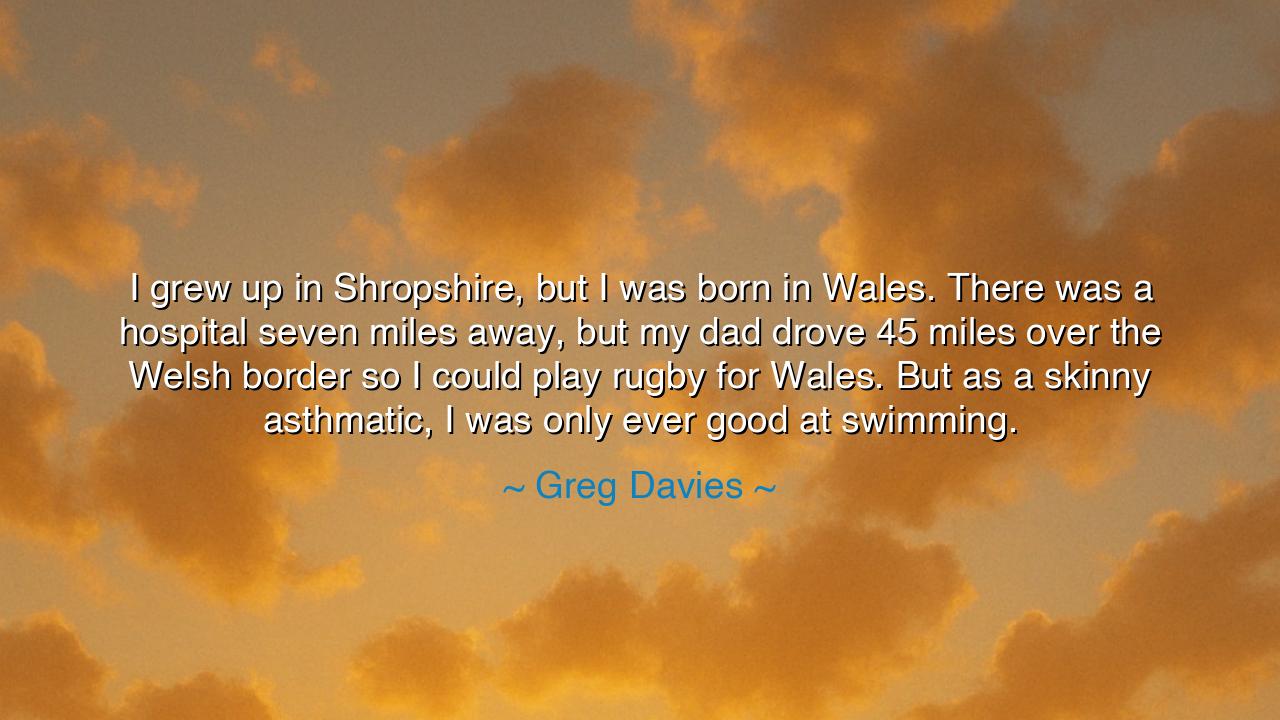
I grew up in Shropshire, but I was born in Wales. There was a
I grew up in Shropshire, but I was born in Wales. There was a hospital seven miles away, but my dad drove 45 miles over the Welsh border so I could play rugby for Wales. But as a skinny asthmatic, I was only ever good at swimming.






When Greg Davies said, “I grew up in Shropshire, but I was born in Wales. There was a hospital seven miles away, but my dad drove 45 miles over the Welsh border so I could play rugby for Wales. But as a skinny asthmatic, I was only ever good at swimming,” he spoke not merely of geography or sport, but of identity, ambition, and the quiet humor of human destiny. His words, wrapped in wit, reveal the tender story of a father’s pride and a son’s self-discovery—a tale both rooted in belonging and elevated by irony. For within that short reflection lies the eternal lesson that life often carries us far from the dreams others imagine for us, and yet, in doing so, leads us closer to who we truly are.
The origin of this quote rests in the heart of the British borderlands, where the line between England and Wales blurs across hills and heritage. Born to Welsh parents but raised in Shropshire, Davies’s very birth became an act of symbolic loyalty—his father, filled with the spirit of his homeland, chose to drive forty-five miles to ensure that his son would be born Welsh by right, that he might one day wear the red dragon and play the sacred game of rugby. This gesture, both loving and nationalistic, stands as a testament to the power of heritage—the way a parent’s pride can shape the identity of their child even before the first breath is taken. Yet, as life would have it, the boy born to run the fields found his strength in the water instead, and the dream of rugby was replaced with the reality of swimming—where breath, not brawn, was his victory.
In this lies a profound reflection on expectation and individuality. Every parent dreams of what their child might become, yet the path of destiny often veers in unexpected directions. Davies, through his humor, honors both the devotion of his father and the irony of fate. His story reminds us that we are not bound to fulfill the designs of others, even those born of love. We inherit their hopes, yes—but our purpose is to forge something of our own. For what is nobler: to chase another’s dream or to discover one’s own gift, however humble? The ancient philosophers would answer, as Socrates did, that the truest virtue lies in knowing oneself—not who one was meant to be, but who one is.
There is also tenderness in his mention of being a “skinny asthmatic.” The line is self-deprecating, but beneath it breathes a deeper truth: that human strength often hides in places where the world sees weakness. In the ancient myths, heroes are rarely the ones born perfect—they are those who transcend their flaws. The Greek hero Odysseus, known not for brute strength but for cunning and endurance, triumphed where others fell. So too did Davies, though perhaps not on the rugby field his father envisioned, find his strength elsewhere—in art, in laughter, in the quiet endurance that defines those who must breathe carefully, yet live fully. His life, shaped by humor and intellect, became his field of play—a stage where the soul, not the body, proved its power.
The image of the father driving 45 miles “so I could play rugby for Wales” is both heroic and poignant. It captures that fierce, irrational love that parents hold for their children—a love that seeks to grant every advantage, every belonging, even to the unborn. Yet it also shows how identity can be inherited yet not inhabited. One may be born into a flag, a culture, a dream, but it is one’s choices that give those symbols meaning. Greg Davies honors his father’s act not by fulfilling it literally, but by carrying forward its spirit—the passion, the pride, and the humor that are as Welsh as the red dragon itself.
In this way, his story becomes more than a joke—it becomes a reflection on the paradox of belonging. We are shaped by where we come from, but we are not confined to it. The land, the family, the dreams that give us roots must not become our chains. Like the swimmer he became, one must learn to glide through life’s waters, carrying both ancestry and individuality with grace. Davies’s humor conceals wisdom: that happiness lies not in meeting expectations, but in accepting the irony of life—that what we become may differ from what was intended, yet still hold truth and beauty.
So, my children of the present age, take this story as a gentle teaching: honor where you come from, but do not be trapped by it. Accept the gifts of your ancestors, but use them to create your own path. If life drives you forty-five miles away from the nearest dream, let it—but when you find your own strength, whether in the field or in the water, pursue it with all your heart. For the true measure of a person is not in where they were born, but in how they choose to live. As Greg Davies reminds us with both laughter and wisdom, happiness may not come from the destiny others planned for us—but when we embrace our own strange, beautiful truth, it is no less profound.






AAdministratorAdministrator
Welcome, honored guests. Please leave a comment, we will respond soon